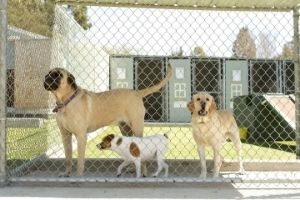As the summer is nearing an end, everyone is likely trying to squeeze in one last trip. While many of us dog owners would take our fur babies with us wherever we go, it’s not always feasible or even advisable depending on where you’re going and/or how you’re getting there. The ultimate goal is to be able to leave your faithful, furry friend with someone you trust so you can rest easy while you’re gone.
If you’re new to dog boarding, there is a lot that you should know about how to best prepare to make this the best possible experience for you and your doggo. We’ve rounded up some answers to some frequently asked dog boarding questions below so that you can ease any worries you have about leaving your precious pet.

What are the benefits, if any, to boarding my dog with a veterinarian versus a boarding facility?
The biggest benefit of going with a veterinary office is that the staff of the boarding facility will interact with the staff of the hospital and it'll be a benefit to your dog's wellness. Because if there's some abnormality there, they will pull in at least a veterinary assistant or a veterinary technician and then, if needed, the vet. If a dog is experiencing even a mild case of separation anxiety, they can get diarrhea or avoid eating, so the staff of the boarding facility can consult with the hospital staff on how to rectify these types of situations for the pet.
While regular boarding facilities often have a veterinarian that they contact for issues, it’s nice to have one onsite for things as they arise. This is of particular benefit to you if your dog is already suffering from a previously diagnosed illness.
Why do some vets offer dog boarding while others do not?
It’s a lot of work for the front desk and involves a significant amount of record keeping. It's also a function of the available room because it takes a lot of floor space and staff to do boarding. On the other hand, a really busy boarding operation will feed an animal hospital and really help it to grow because it's a secondary service. So the veterinary practice will have to weigh the pros and cons for them in order to decide whether to include boarding as part of their services.
If a kennel or other non-veterinary affiliated boarding facility is the only option for me, what questions should I ask when I visit?
First and foremost, you should ask what the dog vaccination requirements are for entry for the pet into the facility as well as any fecal requirements. Pets should be vaccinated approximately two weeks prior to being boarded, and if your dog has never had a vaccine, they need to finish their series before they go into a facility. Any reputable facility will require this, and you should want that in order to keep your own dog safe from illness and disease.
You should also decide whether you are okay with their level of interaction that they allow between other dogs. Some pet owners long for this play for their pooches, while others don’t want the inherent risk that comes from dogs interacting and potentially roughhousing.
Of course, you’ll want to get a general sense of how clean the facility and kennels are. Any veterinarian or boarding facility employee will likely tell you that it’s nearly impossible to keep it perfectly sterile at all times due to accidents and the busy nature of these facilities, but it should be as clean as possible.

What would I need to know before I board my dog?
As previously mentioned, your dog should be up to date on vaccines—all of them except the Lyme vaccine. But if they're in a Lyme endemic area, they should have that as well. Although Lyme disease cannot be transmitted from one dog to another, there could be ticks in the yard where the dogs get exercise. The core vaccines of rabies and distemper should definitely be in place. The kennel cough vaccine, which is bordetella, is also a high-value vaccine. It has adenovirus in it as well as parainfluenza, so it's bordetella, adenovirus, and parainfluenza.
As far as the other vaccines, leptospirosis is transmitted by urine from other dogs. So it would be a good idea for your dog to have that because they share common airing facilities so they'll be put out for a run outside or walked in the same areas another dog has urinated. You also want both varieties of influenza vaccines, so you want bivalent influenza.
Facilities should also be looking at internal parasite load because the intestinal parasites are transmitted in a fecal/oral fashion or through the skin, the latter of which is called “transcutaneous” in the case of the hookworm. So if a dog defecates in the yard and another dog comes along and walks through it, licks their feet, and if there are hookworm eggs or roundworms eggs on the feet, eggs can hatch in the intestine and they then migrate through the body and into the lungs. They can develop into adults that then start producing more eggs. The hookworm can also hatch in the yard or on a dog-friendly beach, and they can then come up and crawl through the skin of a person or the feet of a dog.
Heartworm is likely not a worry because of heartworm preventatives given on a monthly basis, but hookworms and tapeworms are of concern.

How do I know if a dog boarding facility is reputable?
Google reviews are helpful, but it’s hard to beat a personal reference—somebody that's used the facility without difficulty. If the facility has been around for a long time and has serviced a lot of dogs, it’s likely that this facility is reputable. To be honest, even veterinarians will tell you that it’s very difficult to keep every dog 100% healthy in a facility because the stress of being there will many times cause diarrhea. And if they possibly go off of their normal amount of food while there, it can make them appear a little abnormal.
What do dog boarding facilities do in case of emergencies?
If you go with a veterinary hospital, you’re obviously good to go in case of an emergency. Non-hospital facilities partner with an emergency hospital in the case of an injury.

Is it recommended to bring anything for a dog going into a boarding facility?
That can be catch-22 because if you bring something and the dog decides it's going to devour it or eat it, it’s possible for them to experience an intestinal foreign body problem. Many facilities will discourage or all-out ban personal belongings because of this possibility. Make sure to check with whatever facility you choose. If they do allow personal belongings, ensure the dogs are closely monitored. And if your dog has been known to chew or eat things when anxious, scrap the idea of bringing something for them altogether.
What if my dog has anxiety, but they still need to be boarded?
There are drugs that can be used to help with that, although they might be better served by staying at home and having somebody come in because they would be in much more familiar surroundings. And the owner should also prepare the dog with unexpected comings and goings to get them used to the fact that they're going to be alone. If you work from home, try keeping the dog downstairs while you work upstairs, and then only come down for lunch. These sound like minor tweaks but they can have a positive impact. A lot of separation anxiety is brought on by the fact that the owners are just so tightly bonded with that pet and they don't wean the pet from being with them all the time.
There is a product called “Clomicalm” that is made to bridge that gap between where they are and where they need to be as far as independent little beings. But it really is changes in the owner’s habits and preparing them for being alone that will have the biggest impact on the dog’s separation anxiety.

What if I want to know what happens with my dog during the day?
There are elite boarding facilities that have dog exercises, playtimes, and a lot of other fun interactions with other dogs. That is certainly a lot less boring for the dog as long as it's not dangerous and they're with groups of dogs that actually get along. You just need to ask, and then make sure that your dog’s personality is a good fit for what goes on at that facility.
If you have any questions about boarding your dog, please do not hesitate to give us a call.

